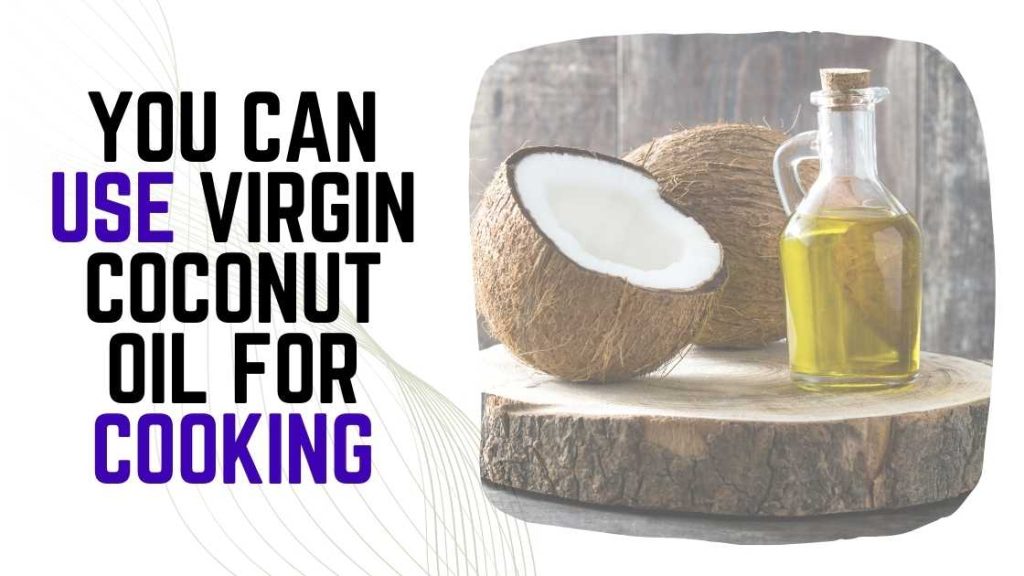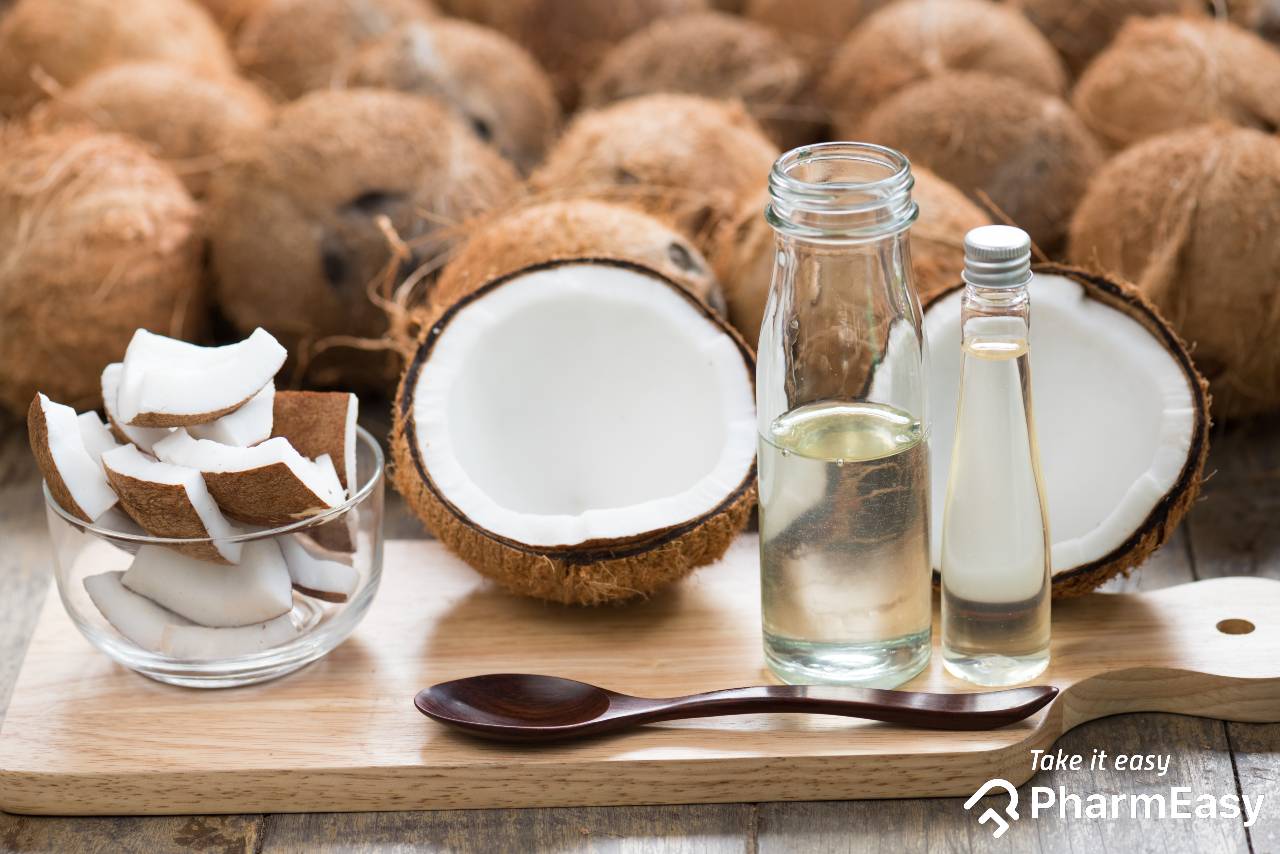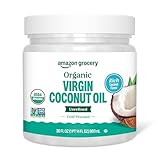Yes, you can use virgin coconut oil for cooking. It is a versatile and heat-stable oil that works well for various cooking methods, including frying, sautéing, and baking.
Virgin coconut oil is made from fresh coconut meat and does not go through a refining process. This helps to keep its natural flavor and nutrients intact. From my experience, this oil has a relatively high smoke point of around 350°F (177°C), making it suitable for medium-heat cooking. I’ve used virgin coconut oil in stir-fries and baked goods. It adds a gentle coconut flavor that improves the taste of the dish without being too strong.

What is Virgin Coconut Oil
Virgin coconut oil is beneficial for cooking because it contains medium-chain triglycerides (MCTs) that are easily digested and can potentially increase metabolism. Additionally, the lauric acid in virgin coconut oil has antimicrobial properties, which contributes to overall health. Virgin coconut oil has a special flavor and health benefits that make it stand out from other oils like olive or vegetable oil.
Virgin coconut oil is solid at room temperature, so you may need to adjust your recipes, especially when baking. I’ve found that melting the oil before mixing it with other ingredients helps achieve the desired consistency.
| Aspect | Details |
|---|---|
| Smoke Point | 350°F (177°C) |
| Saturated Fat Content | Approximately 92% of total fat content |
| Medium-Chain Triglycerides (MCTs) | Comprises about 60% of the fatty acids |
| Lauric Acid Content | About 50% of the total fat content |
| Cooking Suitability | Best for sautéing, baking, and light frying |
| Flavor Profile | Subtle coconut flavor, mild and sweet |
Cooking with Virgin Coconut Oil
Using virgin coconut oil in cooking is a good choice if you want to give your dishes a delicate coconut flavor. Here are some tips and tricks for using it effectively:
1. Flavor Profile
- Coconut Flavor: Virgin coconut oil has a distinct coconut flavor and aroma, making it a great choice for dishes where this flavor is desired, such as Southeast Asian curries, stir-fries, or baked goods.
- Pairing: It pairs well with ingredients like ginger, garlic, lime, turmeric, and tropical fruits.
2. Smoke Point
- Moderate Smoke Point: Virgin coconut oil has a smoke point of around 350°F (177°C), making it suitable for medium-heat cooking methods like sautéing, baking, and light frying.
- Avoid High-Heat Cooking: It’s not ideal for high-heat cooking like deep frying, as it can break down and lose its nutritional benefits.
3. Cooking Applications
- Sautéing and Stir-Frying: Use virgin coconut oil for sautéing vegetables, tofu, or tempeh, as it adds a nice flavor and works well with spices.
- Baking: Substitute butter or other oils with virgin coconut oil in baking recipes for a coconutty twist.
- Pan-Frying: It’s great for pan-frying foods like pancakes, crepes, or plantains, adding a subtle richness.
4. Storage and Usage
- Solid at Room Temperature: Virgin coconut oil is solid at room temperature (below 76°F/24°C), so you may need to melt it before using it in recipes.
- Long Shelf Life: It has a long shelf life, but store it in a cool, dark place to maintain its quality.

Credit: www.amazon.com
5. Nutritional Benefits
- Healthy Fats: Virgin coconut oil contains medium-chain triglycerides (MCTs), which are believed to be easier to digest and may have some health benefits.
- Versatility: It’s suitable for both sweet and savory dishes, making it a versatile addition to your pantry.
6. Recipes to Try
- Coconut Rice: Use virgin coconut oil to sauté the rice before cooking for an extra layer of flavor.
- Coconut-Flavored Stir-Fry: Stir-fry vegetables or proteins in coconut oil, and finish with lime juice and cilantro.
- Baking: Try coconut oil in your next batch of cookies or muffins for a tropical twist.Using virgin coconut oil in cooking is a good choice if you want a gentle taste of coconut in your food.

Credit: pharmeasy.in
Health Benefits of Cooking with Virgin Coconut Oil
Virgin coconut oil is praised for its potential health benefits, making it a popular choice in cooking. Here are some of its key advantages:
- Rich in Healthy Fats: Virgin coconut oil contains medium-chain triglycerides (MCTs), particularly lauric acid, which is thought to have antimicrobial and anti-inflammatory properties. MCTs are metabolized differently from other fats, providing a quick source of energy.
- Supports Heart Health: Some studies suggest that virgin coconut oil may improve cholesterol levels by increasing HDL (good) cholesterol and potentially reducing LDL (bad) cholesterol. However, it’s important to use it in moderation, as it’s still a saturated fat.
- Boosts Brain Function: The MCTs in coconut oil can be converted into ketones, which are an alternative energy source for the brain. This might be beneficial for cognitive function and may have potential therapeutic effects in neurodegenerative conditions.
- Antimicrobial Properties: Lauric acid, a major component of virgin coconut oil, has been shown to have antimicrobial properties that may help in fighting off bacteria, viruses, and fungi.
- Supports Skin Health: Although not directly related to cooking, virgin coconut oil is often used in skincare for its moisturizing properties. It can be used topically to help improve skin hydration and reduce inflammation.
- Stable at High Temperatures: Virgin coconut oil has a high smoke point (around 350°F or 175°C), making it a stable option for cooking at higher temperatures. This stability reduces the risk of harmful compounds forming during cooking.
While virgin coconut oil has these potential benefits, it’s still important to balance it with other types of fats in your diet and consider overall dietary patterns.
10 Tips for Cooking with Virgin Coconut Oil
Virgin coconut oil is a versatile cooking fat with a distinct flavor and several benefits. Here are some tips for using it effectively:
- Choose the Right Type: Virgin coconut oil is unrefined and retains a coconut flavor and aroma. If you want a neutral taste, look for refined coconut oil.
- High Smoke Point: Virgin coconut oil has a smoke point of around 350°F (175°C). It’s suitable for medium-heat cooking, like sautéing and light frying. Avoid using it for high-heat cooking or deep frying.
- Flavor Considerations: Its coconut flavor can enhance dishes like curries, stir-fries, and baked goods. However, it might not be ideal for recipes where you don’t want a coconut taste.
- Storage: Keep it in a cool, dark place. Coconut oil solidifies at room temperature below 76°F (24°C), so it might need to be melted before use.
- Solid or Liquid: Depending on the temperature, virgin coconut oil can be solid or liquid. Both forms work well for cooking; just remember to adjust the measurement if a recipe specifies one form.
- Nutritional Benefits: It’s high in medium-chain triglycerides (MCTs), which are thought to have various health benefits. Keep in mind, though, that it’s still high in saturated fats, so use it in moderation.
- Baking: You can use it in baking recipes as a substitute for butter or other oils. It works well in cookies, cakes, and muffins, adding a subtle coconut flavor.
- Sautéing and Stir-Frying: For dishes like vegetables or tofu stir-fries, virgin coconut oil adds a nice tropical touch and a slight sweetness.
- Seasoning: Because of its flavor, it pairs well with dishes that complement coconut, like tropical fruit salads, or dishes with curry or spices.
- Healthier Alternatives: If you’re looking to reduce the saturated fat content, you might want to mix coconut oil with other oils like olive oil for a balanced fat profile.
Is Virgin Coconut Oil Healthy for Cooking?
Virgin coconut oil is considered healthy due to its high content of medium-chain triglycerides (MCTs), which are easily digestible and can provide a quick source of energy. It also contains lauric acid, known for its antimicrobial properties. However, like all oils, it should be used in moderation as part of a balanced diet.
What Is the Smoke Point of Virgin Coconut Oil?
The smoke point of virgin coconut oil is approximately 350°F (177°C). This makes it suitable for medium-heat cooking methods such as baking and sautéing. However, it may not be the best choice for high-heat cooking, like deep frying, as it can start to smoke and break down.
Can You Use Virgin Coconut Oil for Baking?
Yes, virgin coconut oil is excellent for baking. It can be used as a substitute for butter or other oils in recipes, adding a subtle coconut flavor to baked goods. When using it in baking, you can substitute it in equal amounts for other fats.
Does Virgin Coconut Oil Change the Flavor of Food?
Virgin coconut oil has a distinct coconut flavor that can influence the taste of your dishes. While this is often a desirable trait in tropical or sweet recipes, it may not be suitable for all types of cooking, especially if you prefer a more neutral flavor.
Is Virgin Coconut Oil Suitable for Frying?
Virgin coconut oil can be used for frying, but it’s best suited for shallow frying or light sautéing due to its medium smoke point. For deep frying, oils with higher smoke points, like peanut or sunflower oil, may be better options.
How Should Virgin Coconut Oil Be Stored?
Virgin coconut oil should be stored in a cool, dark place, away from direct sunlight. It solidifies at temperatures below 76°F (24°C) and can be stored at room temperature or in the refrigerator. If solidified, it can be easily melted by placing the jar in warm water.
What Are the Benefits of Cooking with Virgin Coconut Oil?
Cooking with virgin coconut oil offers several benefits, including its potential to support heart health, boost metabolism, and provide antimicrobial effects. Its natural antioxidants can also help in reducing oxidative stress.
Can Virgin Coconut Oil Be Used for All Types of Cooking?
While virgin coconut oil is versatile and can be used in many cooking methods, it may not be suitable for all types of cooking, especially those requiring very high heat. Its distinct flavor may also not be ideal for all recipes. It’s best used in dishes where its flavor complements the other ingredients.
Is Virgin Coconut Oil a Better Option Than Other Oils?
Virgin coconut oil is a good option for those seeking a natural, unrefined oil with health benefits. However, it’s important to choose oils based on the specific needs of the dish and your dietary preferences. Each oil has its own unique properties and benefits.
Final Decision
You can use virgin coconut oil for cooking! It has a high smoke point of around 350 °F (177 °C), which makes it suitable for various cooking methods like sautéing, stir-frying, and baking. Virgin coconut oil has a distinct coconut flavor, so it works particularly well in dishes where that flavor is complementary, such as tropical recipes or desserts.
Just keep in mind that if you’re looking for a neutral flavor, refined coconut oil might be a better choice, as it has a higher smoke point and a milder taste.
| Aspect | Details |
|---|---|
| Smoke Point | 350°F (177°C) |
| Fat Composition | 92% saturated fat, primarily MCTs |
| Calories per Tablespoon | 117 calories |
| Lauric Acid Content | 40-50% of total fat |
| Common Cooking Uses | Sautéing, baking, frying |
| Flavor Profile | Mild, sweet coconut flavor |

I may be a little “crazy” when it comes to cooking, but I enjoy every minute of it. Spending time in the kitchen itself, whether with my family or my friends, brings me both happiness and exhilaration. This blog was created to showcase my cooking/eating with family and friends. And also as an opportunity to discuss ideas on food and the culinary circle in general.





Pingback: Can You Use Whipping Cream for Cooking? Discover the Versatility! - Kitchen World